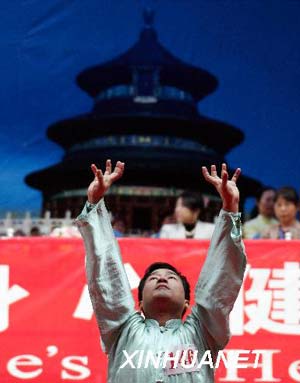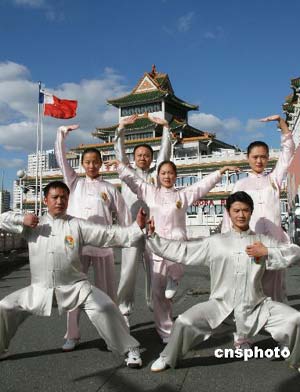"Going abroad" has become a popular phrase in China as its fast growing enterprises are doing more business outside. Traditional Chinese culture is also following this trend. Qigong, one of the cultural symbols, is going abroad to show off the skills which have taken thousands of years to develop.
When Chinese around the world celebrate their Lunar New Year next month, six delegations, organized by the Chinese Health Qigong Association (CHQA), will visit seven countries - Canada, Britain, France, Belgium, Germany, Australia and the United States, all places they have never been before.
A man practises Qigong at 2nd International Health Qigong Demonstration and Exchange, Aug. 25, 2007. (File Photo)
During the visits, 40 plus trainers of qigong, a system of deep breathing exercises, will demonstrate their skills in squares of big cities, and hold news conferences to introduce this Chinese traditional art of fitness.
According to Zou Jijun, vice president and secretary general of the CHQA, these qigong trainers are professors in sports universities, and state-level trainers from China's provincial areas. In order to better promote Health Qigong, they will also train local trainers so that the trainers can spread the concept abroad.
"Health Qigong is a gem of Chinese traditional culture. Its Chinese characteristics and healthy lifestyle may attract foreigners who are interested in Chinese culture and health," said Zou.
As the double-digit growth of China's economy continues, Chinese traditional culture has become a focus for the outside world. Some typical Chinese symbols, like martial arts, acupuncture and tai chi have spread around the globe.
Qigong (also written as Chi Kung) refers to the type of exercise that manages the health of mind, body and breath. The word consists of two Chinese characters: qi and gong. Qi, as used in the context of the phrase qigong, refers to both the signal that controls the functioning of the body and the actual functions of the body. The word gong is the short form for gong fu (kung fu), which means training with time and effort.
In its 5,000-year history, qigong has absorbed different traditional Chinese cultural schools. The CHQA said that Confucians practise qigong to cultivate mind and body; Taoists and Buddhists do it to transcend worldliness; Chinese doctors use it to cure illness and maintain health; and martial arts practitioners do it to defend and fight attacks.
Nowadays, qigong has been classified into two categories: one is Medical Qigong, which is used in some Chinese traditional medical treatment, and the other is Health Qigong, which people use to stay healthy.
Zou said that based on traditional qigong practices and the needs of modern society, the CHQA has released four sets of practice forms, the oldest one of which, Wu Qin Xi (Frolics of Five Animals) dates back some 2,000 years ago. They have been widely practiced in China. Chinese people practiced it to prevent minor diseases, improve their immune system and prolong life.
"Body activity can decrease fat, while strength practice can prevent calcium depletion, which is the major cause of osteoporosis. It also can help improve heart-lung function. Adjusting the breath can improve the functions of internal organs," said Professor Hu Xiaofei of Beijing Sports University. Hu is a professor with and an expert in sports health preservation. As a member of a delegation, Hu will visit the United States next month as a trainer.
Delegation from Chinese Health Qigong Association perform in France in October 2007.(File Photo)
Because of its effectiveness, Health Qigong is popular. Every morning, senior citizens gather in parks and on riverbanks to practise qigong, making it a typical scene of Chinese city life. Zou with the CHQA said that more than 80 million people practise qigong throughout China.
At the same time, foreign people have been attracted to qigong. Etsuko Kunisada, aged 31, is an example. She gave up her well-paid job in a bank in Japan's Osaka March last year when she decided to go to Beijing. Later, she became a fan of Chinese culture and began to practise tai chi. After a year of practice, she found it was still interesting, but had become more and more difficult.
"When I practise tai chi, I need to practise how to breathe. I find that tai chi and qigong are interrelated, and qigong can help me breathe more smoothly," said Etsuko. So she began to practise qigong three times a week at Beijing Sports University (BSU). According to the BSU, hundreds of foreigners like Etsuko come to the university to study qigong every year.
In order to attract more foreign practitioners, Zou said the CHQA has held three rounds of overseas promotion activities since 2006. They have visited nearly 30 countries, in which more than 50,000 foreign people watched their demonstrations, while 10,000 plus began to practise the exercise. Now the CHQA has more than 50organizations overseas, and deployed trainers in 29 countries. A total of 36 promotion activities have been planned for this year.
The German team perform Qigong at 2nd International Health Qigong Demonstration and Exchange, Aug. 25, 2007. (File Photo)
"Qigong is a kind of vehicle, through which foreign practitioners can better understand China and its traditional culture," said Zou. When people enjoy their Chinese-style fitness, they experience the unique Chinese concept of life and humanity at the same time.
As the number of practitioners of tai chi and qigong is increasing in Japan, Etsuko hoped she could open a Chinese fitness center after returning home. With this promotion method of training the trainers, Zou Jijun of the CHQA believes that more and more foreigners will be interested in Health Qigong.
"We are trying to introduce to the outside world a healthy lifestyle," said Professor Hu Xiaofei, adding excessive nutrition and insufficient body exercise cause a lot of modern diseases, while the ancient Chinese noted some 2,000 years ago that being moderate in eating was a healthy habit.
"Most of China's senior citizens enjoy healthy lives. They practise tai chi and qigong in the parks every morning, instead of laying on a bed with their lives being maintained by medical equipment," said Hu.
"The concept of integration in China's health philosophy is different from western medicine. By adjusting body, breath, and mind, qigong makes the practitioners healthy and strong. Foreigners may be interested in this integrated method," said Zou.
Besides the attitude to health, qigong embraces far more Chinese life philosophy, said Hu. Qigong practitioners have to concentrate their minds when practicing. They have to be peaceful and quiet during their practicing. Qigong needs a moderate attitude, instead of being emulative in competitive sports. All these requirements will help build a moderate, peaceful and amiable character, a typical Chinese person's character created mostly by Confucian philosophy.
"In the Chinese concept of health, the body, mind, moral character and self-cultivation are all interrelated, thus practicing qigong is learning the Chinese way to conduct oneself in society at the same time," said Hu.
However, Hu believes what's more important is that the philosophy qigong embraces promotes not only the integration of body and mind, but also the environment and mankind, society and individuals. In the rapidly growing modern international society challenged by environmental pollution and social conflicts, this philosophy seems critical for building a harmonious world.
"When people have fewer diseases and material desires, they can live in harmony and peace," said Hu. "However, a result-oriented attitude may lead to problems and failure. Instead, we should enjoy the process and practise the lifestyle."
(Xinhua News Agency January 26, 2008)




